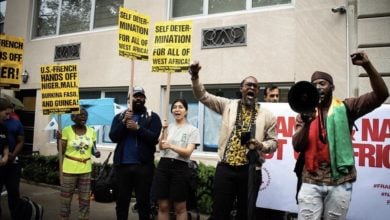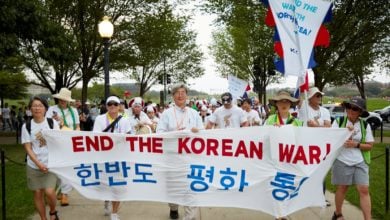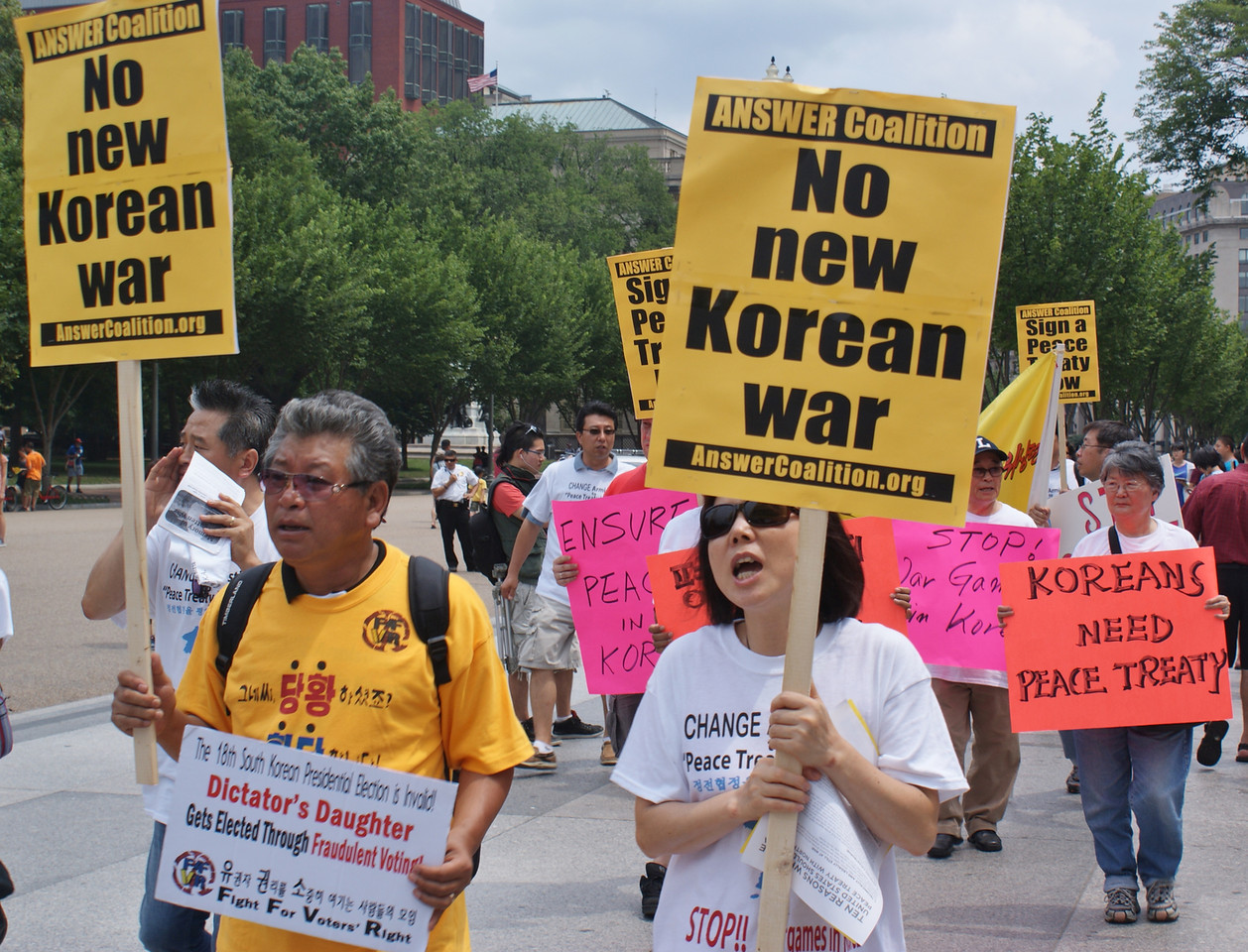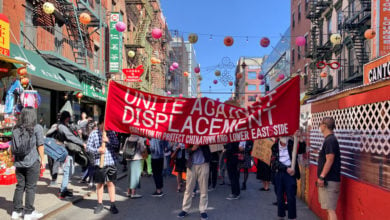Excerpts from a presentation given by Brian Becker on March 9, 2018
The announcement that Donald Trump has agreed to meet at the invitation of President Kim Jong Un and the leadership of the Democratic People’s Republic of Korea is an event with potentially far-reaching consequences, and its possible impact cannot be overstated. No sitting U.S. president has met directly with the North Korean government.
Socialists need to be clear about what the DPRK wants. The current leadership in North Korea seeks to normalize relations with the United States.
It is often stated that North Korea seeks a “security guarantee” from the United States. That is not accurate. The DPRK leadership, having endured non-stop hostility from the United States since the mid-1940s, is under no illusion on this score. It is important that socialists not accept the conventional language and conventional perspective of bourgeois commentators, be they liberal or conservative.
The DPRK leadership knows full well, based on the history of the past 73 years, that U.S. imperialism wants to carry out regime change, overthrow the leadership of the Workers Party of Korea, and impose neo-colonial domination over the northern half of the Korean peninsula. They know that the objectives of U.S. imperialism will not change one iota even if they enter into negotiations, sign a peace treaty, or lift economic sanctions.
In the face of the organically counterrevolutionary orientation of the U.S. empire, it is inconceivable that the U.S. political establishment and its military, intelligence and surveillance institutions would ever abandon this ultimate objective of counterrevolution.
This has been proven wherever imperialism has been compelled to normalize relations with any worker’s state — or what is known in popular vernacular as the socialist countries.
The same pattern played out with the U.S. normalization of relations between the Soviet Union earlier, as well as with the People’s Republic of China in the early 1970s, and in the first steps in that direction by president Obama towards Cuba in 2015. Official normalization did not in any way, shape or form, ameliorate the desire of imperialism to overthrow those governments.
Lessons of normalization with China, the Soviet Union and Cuba
The normalization of relations between the United States and the various socialist governments was predicated on different needs, requirements and realities imposed on both sides.
In the case of the People’s Republic of China, the Nixon administration dropped the long-standing U.S. position of excluding the PRC from the United Nations. Since the victory of the 1949 Chinese revolution, the U.S. had used its power in the United Nations to exclude the PRC from the UN, thus allowing the rump and defeated government of Chiang Kai-Shek, which illegally occupied the Chinese island of Taiwan, to be a member of the UN and one of the five permanent members of the Security Council. It may be hard to believe that the government in Taiwan actually exercised the prerogative of a UN Security Council veto until Nixon changed the U.S. position, but this is a fact of history.
The reason that Nixon decided to normalize relations with the People’s Republic of China was to exacerbate the Sino-Soviet split and create a de facto anti-Soviet alliance between the United States and China. In effect, this is precisely what happened in the mid-1970s. Thus, we can see that U.S. imperialism had its own nefarious and counterrevolutionary goals in the normalization of relations with China.
It is critically important, however, that socialists take the correct position on this question. In spite of the reactionary motives of U.S. imperialism, all genuine socialists fully supported the right of China to have normalized relations with the main imperialist government in the world. Supporting China’s right to normalize relations with the United States did not mean that socialists needed to endorse China’s foreign policy at the time. Normalization, regardless of the political motivations, results in less economic, military and diplomatic pressure on a worker’s state.
Earlier, the United States had normalized relations for the first time with the Soviet Union after Franklin D. Roosevelt came into office in the 1930s. By 1942, the United States entered into a military alliance with the Soviet Union and Britain against fascist Germany. After the defeat of Germany and the end of World War II, U.S. imperialism resumed a counterrevolutionary offensive against the Soviet Union, inaugurating the era that became known as the Cold War.
In the case of Cuba, Obama represented one sector of the imperialist establishment that concluded that the policy of naked, unadulterated hostility and aggression had failed in defeating the Cuban revolution and had only succeeded in isolating the United States in Latin America. The first steps towards normalization were taken by Obama but are not completed. This was a step forward for Cuba, and the government in Havana considered it a major victory in their decades-long struggle to overcome economic and military aggression. At the same time, the Cuban leadership undoubtedly recognized that the process of normalization would present new challenges because imperialism would present new, different and more subtle forms to overthrow the socialist government. The effort to make a counterrevolution has not ended.
Cuba’s strength and its steadfastness, coupled with a supple but firm diplomatic perspective, changed the relationship of forces and succeeded in forcing the United States to begin the process of diplomatic and economic normalization. It was a small step forward, but an important one. Obama and his faction in the ruling class did not end the blockade, even if they desired to do so, and the successor Trump administration has reversed many of the initial openings — which is another possibility that always exists in relations between imperialist and socialist countries.
Understanding both sides’ motives in DPRK-U.S. relations
In examining the recent developments regarding North-South relations in Korea and DPRK-U.S. relations, it is important to recognize some of the important changes that have led to the possibility of the first meeting between a U.S. head of state and the leadership of the DPRK.
- The Obama administration’s policy of “strategic patience” towards the DPRK was a colossal blunder from the perspective of U.S. imperialists, based on their extreme arrogance. The Obama White House assumed that the DPRK’s nuclear and missile tests would not lead anywhere and were simply a form of political theater designed to create “a provocation” that would stimulate U.S.-DPRK talks. While the United States was bogged down in the Middle East, the DPRK used the eight years of the Obama administration to develop a significant nuclear and long-range and intermediate missile capability. The ultimate success of the DPRK in acquiring new, advanced weapons technology systems both in the area of nuclear weapons and long-range missile technology has shifted the relationship of forces. The DPRK obviously does not want to initiate a war with the United States, but it has developed a credible deterrent capability, including a capacity to strike long-range targets with nuclear weapons in the event of a war.
- The Moon Jae In government in South Korea has from the beginning sought to initiate a thaw in North-South relations. His government and senior staff are part of a sector within the South Korean political establishment that dates back to the ascension of Kim Dae Jung in the late 1990s. This is the “liberal” wing of the South Korean political establishment and many of its key cadre and leaders date their own political genealogy back to the radical student movement of the 1970s and 1980s, which was repressed by the South Korean military dictatorship with the backing of the United States. The Moon administration and South Korean government has limited sovereignty because of the preponderant position of U.S. imperialism in the country. This includes U.S. military forces who are still technically the operational leadership of the South Korean military in the event of a military crisis. President Moon has been determined to move the peace process forward, and has done just that, while at the same time making every effort not to offend Donald Trump or the United States.
- The leading force in this process from within the U.S. establishment appears to be Donald Trump himself, as odd as that may seem. Trump has made the most bellicose statements against North Korea, has imposed severe sanctions to economically punish the entire Korean people, and his administration treated the symbolic steps towards peace at the Olympics with contempt. But the Trump White House is beleaguered, under extreme domestic political pressures, targeted by a profound internecine battle going on within the political forces of the U.S. ruling class, and a criminal investigation which could lead to additional indictments and possible impeachment.
Thus, for personal and political reasons, Trump can envision himself as the “leader” who could affect a historic change in a primary global political arrangement. Richard Nixon, the right-wing war criminal and anti-communist, became the political leader within the establishment who opened the door to normal relations with “Red China” as it was known. Nixon cemented for himself the reputation as a grand master in geostrategic politics. Donald Trump, a mid-level real estate developer and reality TV personality whose star was in eclipse before he ran for office, can envision himself as a celebrated and grand dealmaker to conclude a war that began 68 years ago and has never ended.
It is clear from the coverage in the capitalist mainstream media, reflecting the different factions and trends within the U.S. ruling class, that Trump is at least for the moment bucking the tide of skepticism and hostility. There are already big attacks against him for having dared to suggest that the United States could open direct negotiations with the DPRK under current circumstances in which the DPRK has strengthened its position militarily. Under pressure from ruling class opposition Trump is now (March 9) hedging and putting pre-conditions on the meeting with the DPRK, leaving open the possibility that the meeting will not actually happen. - The Party for Socialism and Liberation and other socialists, firmly support the right of the DPRK to have normal relations with the U.S. government and any government in the world. The economic sanctions imposed on the DPRK are designed to cause famine and economic destabilization and regime change. The diversion of a huge part of its national budget for military and defense purposes is also a drag on socialist economic construction and makes it harder to provide the population with food, fuel and medicines, as well as consumer goods that are necessary and desired.
- The PSL’s position towards the DPRK and other socialist governments is one of political defense against the forces of imperialism and domestic counterrevolution. We are politically independent. We establish our own assessment, analysis and political orientation. The anchor for our political understanding and strategy is militant and uncompromising opposition to imperialism in its pursuit of regime change strategies against socialist and also bourgeois-nationalist governments which were created as part of the anti-colonial revolutionary wave of the post-World War II era. We do this while retaining absolute political independence in order to assess unfolding events in a way that provides clear political understanding and orientation for the working class movement inside the United States.






